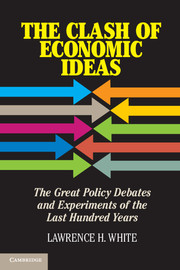Book contents
- Frontmatter
- Contents
- Figures
- Acknowledgments
- Introduction
- 1 The Turn Away from Laissez-Faire
- 2 The Bolshevik Revolution and the Socialist Calculation Debate
- 3 The Roaring Twenties and Austrian Business Cycle Theory
- 4 The New Deal and Institutionalist Economics
- 5 The Great Depression and Keynes’s General Theory
- 6 The Second World War and Hayek’s Road to Serfdom
- 7 Postwar British Socialism and the Fabian Society
- 8 The Mont Pelerin Society and the Rebirth of Smithian Economics
- 9 The Postwar German “Wonder Economy” and Ordoliberalism
- 10 Indian Planning and Development Economics
- 11 Bretton Woods and International Monetary Thought
- 12 The Great Inflation and Monetarism
- 13 The Growth of Government
- 14 Free Trade, Protectionism, and Trade Deficits
- 15 From Pleasant Deficit Spending to Unpleasant Sovereign Debt Crisis
- Index
- References
Introduction
Published online by Cambridge University Press: 05 June 2012
- Frontmatter
- Contents
- Figures
- Acknowledgments
- Introduction
- 1 The Turn Away from Laissez-Faire
- 2 The Bolshevik Revolution and the Socialist Calculation Debate
- 3 The Roaring Twenties and Austrian Business Cycle Theory
- 4 The New Deal and Institutionalist Economics
- 5 The Great Depression and Keynes’s General Theory
- 6 The Second World War and Hayek’s Road to Serfdom
- 7 Postwar British Socialism and the Fabian Society
- 8 The Mont Pelerin Society and the Rebirth of Smithian Economics
- 9 The Postwar German “Wonder Economy” and Ordoliberalism
- 10 Indian Planning and Development Economics
- 11 Bretton Woods and International Monetary Thought
- 12 The Great Inflation and Monetarism
- 13 The Growth of Government
- 14 Free Trade, Protectionism, and Trade Deficits
- 15 From Pleasant Deficit Spending to Unpleasant Sovereign Debt Crisis
- Index
- References
Summary
The last hundred years have seen dramatic experiments in economic policy: the adoption of central banking in the United States and elsewhere; command economies during the First World War; communist central planning in the Soviet Union, Eastern Europe, and China; fascism in Mussolini’s Italy; National Socialism in Hitler’s Germany; the New Deal in Roosevelt’s United States; the Bretton Woods international monetary system and the adoption of Keynesian macroeconomic policies after the Second World War; major nationalizations in postwar Great Britain; the reemergence of free-market principles in postwar Germany; Soviet-style Five-Year Plans in India; the final abandonment of gold in favor of a system of fluctuating exchange rates among unanchored government fiat monies; regulation and deregulation and reregulation around the globe; the collapse and repudiation of communism in Russia and Eastern Europe; market-led growth policies in the East Asian “tigers” and then in China and India; “neoliberal” policies promoting the globalization of economic activities. In recent years an unhappy sequence– a worldwide housing credit bubble, followed by the collapse of mammoth financial institutions, followed by expensive government bailouts and takeovers, followed by record-breaking budget deficits and fiscal crises– has returned the issues of monetary policy, regulation, nationalization, and fiscal policy to the front of the economic policy stage across the developed world.
Behind these movements and countermovements in economic policy lies an ongoing and often dramatic clash of economic ideas. The chapters that follow trace the connections running from historical events to debates among economists, and from economic ideas to major economic policy experiments. They will dig selectively into the history of economic doctrines– back to Adam Smith when necessary– to understand how the ideas originated and developed over time to take the forms that they did.
- Type
- Chapter
- Information
- The Clash of Economic IdeasThe Great Policy Debates and Experiments of the Last Hundred Years, pp. 1 - 11Publisher: Cambridge University PressPrint publication year: 2012



